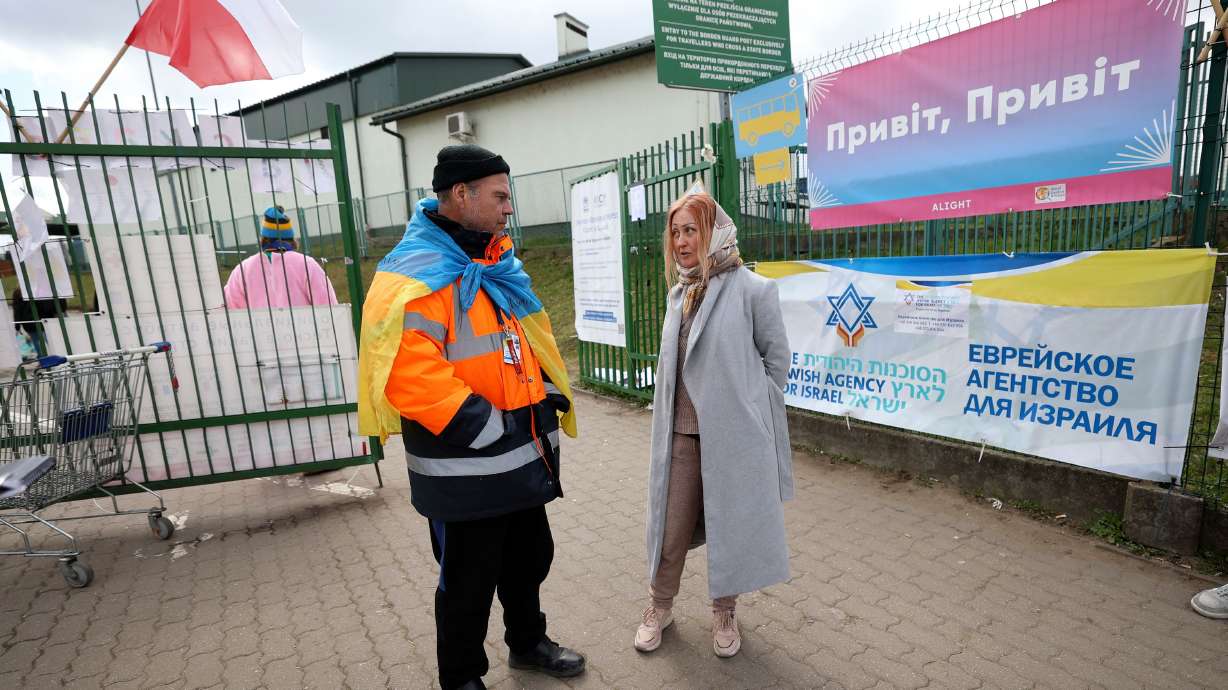Estimated read time: 4-5 minutes
This archived news story is available only for your personal, non-commercial use. Information in the story may be outdated or superseded by additional information. Reading or replaying the story in its archived form does not constitute a republication of the story.
MEDYKA, Poland — Almost 2 million Ukrainian refugees are now living in Russia, some of them forcibly removed in what officials in the war-torn country say is a war crime.
Those numbers come from both Ukrainian and Russian officials, as well as the United Nations' refugee agency, which estimates nearly 1.7 million refugees have crossed the border into the very country that displaced them.
At one point Poland had more Ukrainian refugees than any country, by far. But after millions returned home this spring to safer regions in western Ukraine, or moved on to other countries after their visas were approved, that title now belongs to Russia.
The forcible transfer of civilians to enemy territory generally constitutes a war crime under international law — yet Russia disputes these allegations, and claims refugees are embarking on humanitarian evacuations, many of them eager to start a new life away from Ukraine.
According to the State Department, and refugees that spoke with the Deseret News, Ukrainians transported to Russia after fleeing cities like Mariupol often experience human rights abuses, widespread disorder and a targeted reeducation campaign. Reports of torture and disappearances in filtration camps abound, and U.S. officials allege the Russian government is separating families and putting the children up for adoption.
"President Putin's 'filtration' operations are separating families, confiscating Ukrainian passports, and issuing Russian passports in an apparent effort to change the demographic makeup of parts of Ukraine," Secretary of State Antony Blinken said in a recent news release.
But the situation is nuanced — many refugees are grateful for ordinary Russian citizens who donate their own time, money and resources to make life comfortable for Ukrainians when they arrive.
And some refugees simply want out of Ukraine, even if that means going to Russia.
"America, Russia, Africa? Any country. Just far from this hell," Anzhela Kumurxhi, of Mariupol, told the Deseret News in April.

The journey out of Ukraine
Many Ukrainians that end up in Russia are from occupied regions and cities, according to the U.N. That includes Kumurxhi, who in March fled her apartment in Mariupol with her mother, and was transported via bus to a Russian held village north of the city.
There, they were given a hot meal, hygiene products, clothing and a safe place to sleep, under the watchful eye of Russian soldiers, who entered the refugees' personal information into a database.
Three days later, Kumurxhi and her mother were transported to the Russian border, where the refugees underwent a more thorough, invasive evaluation.
"Everyone went into the office and was inspected. (Russian soldiers) looked at clothes, phones, tattoos. Correspondence in messengers and social networks," she said, noting that Russian troops destroyed every Ukrainian's SIM card, replacing it with a Russian card. "Many questions were asked, especially for men."
What followed was a 28-hour train ride to the Russian city of Tula. Again, the refugees were inspected, though this time the Ukrainians were sorted into two groups — those destined for filtration camps, and those free to go.
Kumurxhi, then sick with the flu, had a sister in Moscow.
"Because of this, I was not filtered in the camp," she said. "In Tula, some people remained in filtration camps, and some went on."
With help from ordinary Russian citizens — many of whom she says were secretly opposed to the war in Ukraine — Kumurxhi was able to take a bus to Estonia. She found a sponsor through the Biden administration's Uniting for Ukraine program, and now lives in Arizona.
Where are the refugees going?
Russia has established a resettlement program for Ukrainians who either "pass" the filtration camps, or aren't sent there to begin with.
Most are technically free to go, but according to several refugees that spoke with the Deseret News, Russian officials sometimes destroy their passports, giving them no option but to stay.
If they make it back into Ukraine, some refugees fear they will be prosecuted for treason by the Ukrainian government, according to The Associated Press.
Many of the refugees are sent to isolated regions in the East, the AP reports, even as far as the sub-Arctic and the Pacific coast. The State Department alleges some families are intentionally separated, and that children from orphanages are forcibly displaced, then put up for adoption in Russia.









